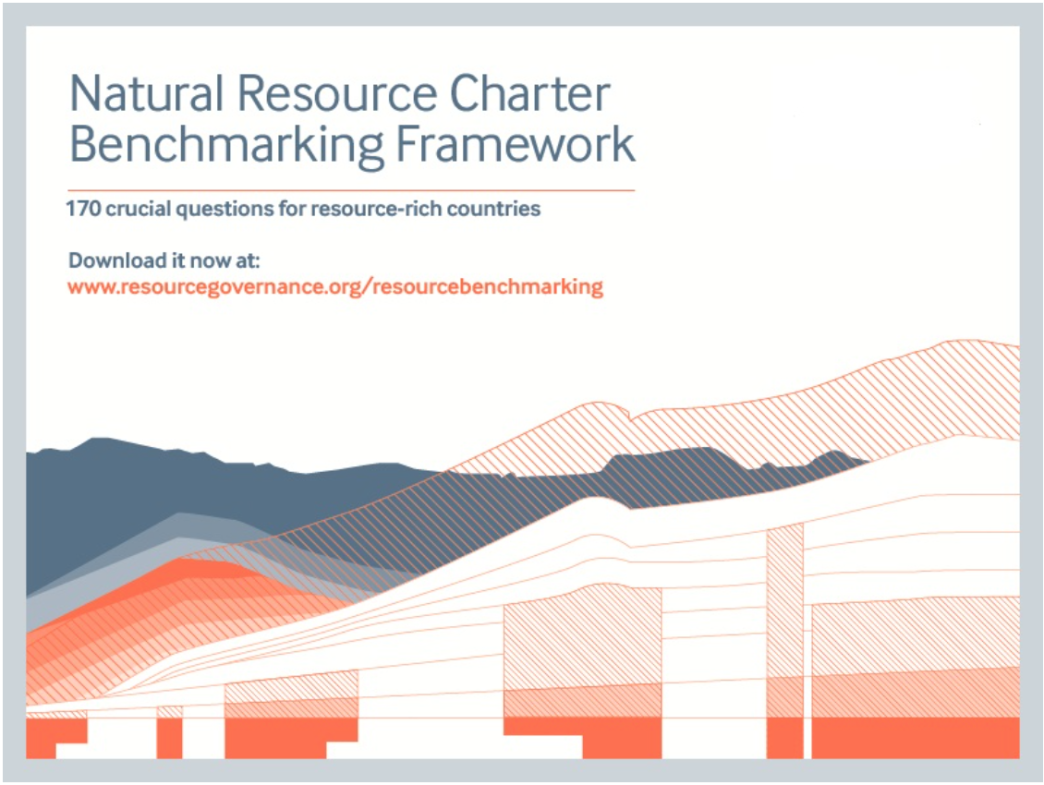
October 2016 News and Analysis from NRGI
Highlights
The Natural Resource Charter Benchmarking Framework is a tool for assessing a country’s management of oil, gas and minerals against global best practices. Created in response to government and civil society demand for a practical way to measure resource governance, the framework is the product of five years of expert input and testing in more than 15 country projects.
Indonesia’s Oil and Gas Legislation: Critical Issues
Indonesia faces several critical decisions as stakeholders finalize long-gestating revisions to the country’s oil and gas legislation. NRGI staff have prepared a briefing (also available in summary in English and Bahasa Indonesia) on critical issues facing the country as the legislative process moves forward. (Read a related op-ed in the Jakarta Post here.)
New Libyan Oil Wealth Fund Chief Talks Reform, Transparency
Oil and the revenues it brings shape Libya’s economic and political landscape. The Libyan Investment Authority (LIA) and its management, therefore, are of central focus for good governance advocates. Here, LIA steering committee Chairman Ali Mahmoud discusses plans to improve the LIA’s governance.
Video
International Open Data Conference
At IODC in Madrid, NRGI's Suneeta Kaimal moderated a session titled "Scaling Up and Deepening Open Data's Transformative Impact in Open Government." Watch it here.
Spotlight on Data
Tunisians Can Now Access Hydrocarbon Contracts in Open Data Format

NRGI, the Columbia Center on Sustainable Investment and the World Bank, in partnership with Tunisia’s Ministry of Energy, Mines and Renewable Energies, have collaborated on the publication of newly released hydrocarbon investment contracts and associated documents. On a new website, the documents are available as searchable open data in a text-based format.
Oil, Gas, Mining Remain Major Focus for FCPA Investigations
The FCPA Blog recently listed companies that are subject to ongoing and unresolved Foreign Corrupt Practices Act (FCPA)-related investigations. Nearly one-third are oil, gas or mining companies. This is a stark reminder that despite low commodity prices, the large rents up for grabs in the extractives sector can create strong incentives for potentially corrupt behavior.

Blog
Five Ways Tunisia’s New Mining, Energy and Renewables Minister Can Maintain Positive Momentum
Tunisia has made startling progress on resource governance in a relatively short time. However, the forward momentum must be maintained. (Read the blog post in Arabic here.)
Tender Moment for Oil Sale Governance in Nigeria
The Nigerian National Petroleum Corporation is seeking new buyers for the country’s oil. In a tender announcement last week, the state-owned company invited “qualified and credible companies” to vie for contracts to purchase Nigerian crude in 2017. The tenders are an opportunity to continue the recent trajectory of improved transparency.
Declining Investment Challenges Pro-Extraction Government in Colombia
The Fundación Foro Nacional por Colombia's fifth annual report on the country's extractive sector assesses the government’s pro-extractive policies; presents information and analysis on the sector’s weight in the economy; discusses the performance of the new royalty system; and presents two local-level “governance agreements” experiences. (Read the blog post in Spanish here.)
MENA Resource Governance Course a Life-Changer
Bechara Youssef Samneh, the technical head of the Central Tender Board within the Central Inspection board for the Lebanese government. He wrote this column about his experience as a participant in "Fundamentals of Oil and Gas Governance."
Upcoming events
Preventing Tax Base Erosion In Africa Paper Launches
Join NRGI for the presentation of Preventing Tax Base Erosion in Africa: a Regional Study of Transfer Pricing Challenges in the Mining Sector on 9 November in New York and 10 November in Washington, D.C. (Listen to a podcast from the London launch here.)
Asia-Pacific Resource Governance Course
The Asia-Pacific Regional Extractive Industries Knowledge Hub offers a two-week course on improving the governance of extractive industries. The course, based in Yogyakarta, Indonesia, is taught in English and includes funding for qualified applicants.
BBC Brasil: Como o Estado participa na exploração de petróleo em outros países? (Portuguese)
AULA Blog: Challenging Assumptions about Supercycles in Peru and Latin America
Schweizer Radio und Fernsehen (Switzerland): Rohstoffhändler für Transparenz – solange es sie nicht betrifft
Schweizer Radio und Fernsehen (Switzerland): Mehr Transparenz für Rohstofffirmen (audio)
Swiss Academy of Sciences (SCNAT): Transparency in Commodities Trading: Options for Action at the International Level and in Switzerland
Ghana Business News: CSOs, Environmental Conservationists in Tanzania Say Country Not Ready for Uranium Mine
Ghana News Agency: African Leaders Should Make Good Deals in Extractive Sector
Quartz: Nigeria doesn’t know exactly how much oil it produces, but is pretty sure USD 17 billion is missing
Ghana Business News: Regional Training Course for African Journalists Opens in Tanzania
Careers and opportunities
NRGI is hiring. Learn more.
